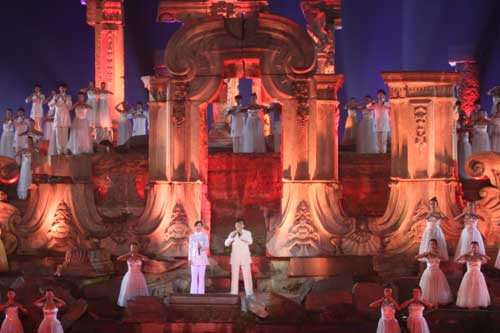Society
Memorial proposed to Yuanmingyuan park
By Cheng Yingqi (China Daily)
Updated: 2010-10-19 07:12
 |
Large Medium Small |
 A commemorative event marking the 150th anniversary of the imperial garden being sacked by occupying forces during the Second Opium War is held on Monday evening, Oct 18, 2010,?on the ruins of Yuanmingyuan, or the Old Summer Palace. [Photo/China?Daily]? |
BEIJING - The Yuanmingyuan park administration issued a proposal on Monday to protect its lost cultural relics as a memorial to the 150th anniversary of the looting of the imperial garden.
The proposal, part of commemorations held by the park administration, urged owners of Yuanmingyuan relics to resist the temptations of the antique trade and return them. It also made recommendations for the study and preservation of the relics.
It was pillaged and burned by British and French troops in 1860 during the Second Opium War, along with several other imperial gardens in Beijing.
"At least 1.5 million relics from Yuanmingyuan have either been looted or otherwise lost over the years," Chen Mingjie, head of the Yuanmingyuan Park Administrative Office, was quoted by Zhengzhou Evening News as having said.
Documents recording all the relics inside the imperial garden were ruined by fires lit by the invading forces, so the exact number of relics that were lost remains unknown, but Yuanmingyuan relics have been found both in China and abroad.
According to UNESCO statistics, 1.64 million Chinese relics are being stored by more than 200 museums in 47 countries, Xinhua News Agency reported.
In February 2009, two of the Yuanmingyuan relics, bronze rat and hare head sculptures, were auctioned by Christie's in Paris for 14 million euros ($19.55 million) each.
The memorial proposal will be on display inside Yuanmingyuan Park for a year to allow supporters to sign their names on it.
In 2006, 22 experts had signed a similar proposal by the State Administration of Cultural Heritage and the Beijing cultural heritage administration, authorizing the Yuanmingyuan Society of China to collect cultural relics from Yuanmingyuan.
By October, 150 relics had been recovered, but Duan Yuhong, of the society's press department, said the process was "much tougher than people thought".
In 2007, the society planned to send emissaries to the United States, Europe and Japan to establish the situation on Chinese relics in these countries, but the project was suspended after the first group went to the US in November 2009.
Duan explained it was a complicated job involving many parties with conflicting interests. Diplomatic, legal and historical considerations also needed to be taken into account at the same time, which made it even more difficult.
In Beijing, more than 100 relics are scattered across the city because their current owners have refused to return them, said Qin Jing, head of the culture relic department of the administrative office.
"The ornamental columns and the white marble Chinese dragon at Peking University, the ornamental columns in the National Library of China and the stone tablets in the Zhongshan Park in Beijing, all belonged to Yuanmingyuan, but were scattered to other places," Qin said.
Li Yao contributed this story.



